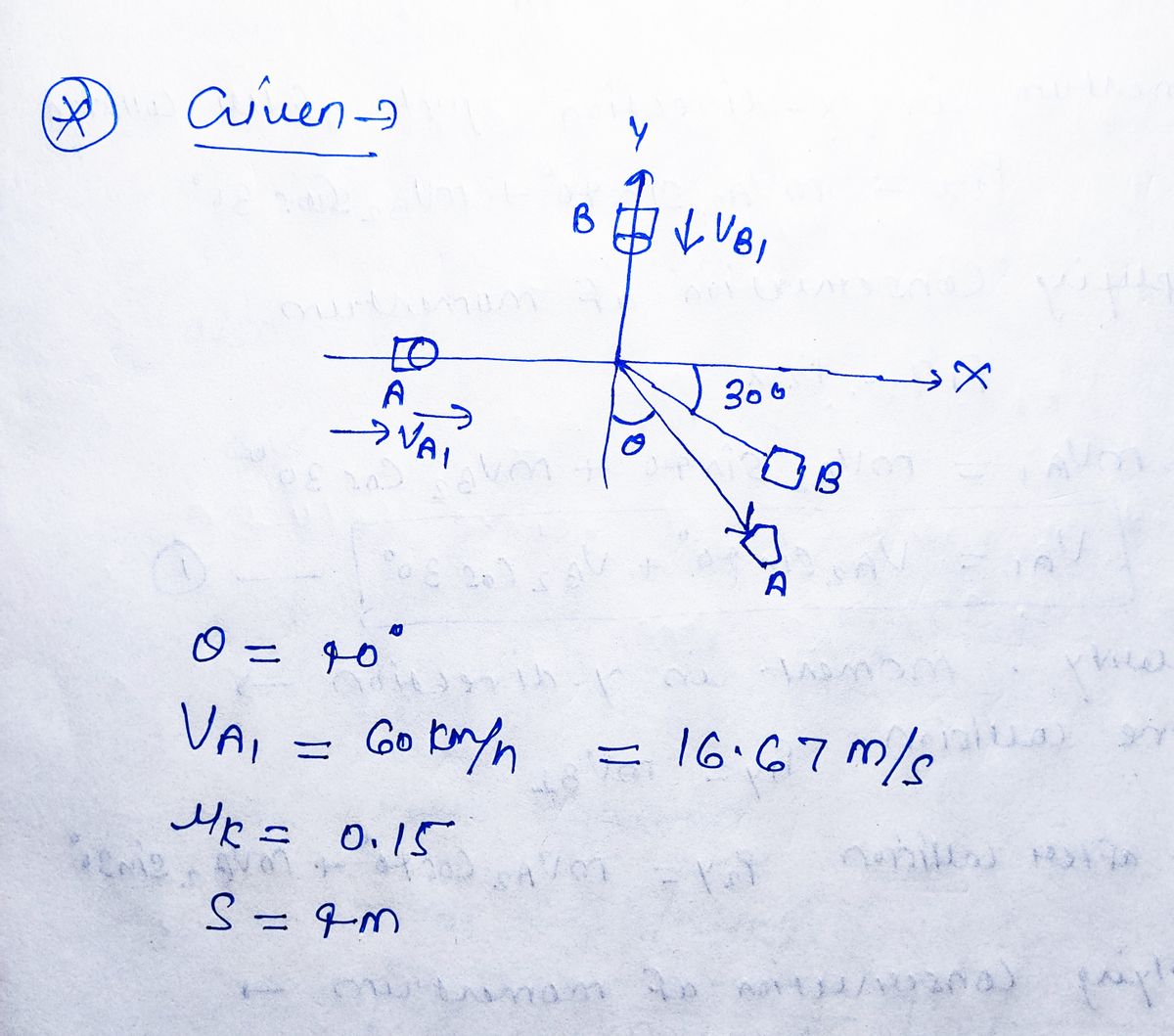Two cars A and B, each having a mass of 1.6 Mg, collide on the icy pavement of an intersection. The direction of motion of each car after collision is measured from snow tracks as shown in (Figure 1). Assume 0 = 40°. The driver in car A states that he was going 60 km/h just before collision and that after collision he applied the brakes, so that his car skidded 4 m before stopping. Assume that the coefficient of kinetic friction between the car wheels and the pavement is k = 0.15. Figure A B O 4 B 1 of 1 Part A Determine the approximate speed of car B just before collision. Note: The line of impact has not been defined; furthermore, this information is not needed for solution. Express your answer to three significant figures and include the appropriate units. VB = Submit Value Provide Feedback Request Answer Units Review ? Next >
Two cars A and B, each having a mass of 1.6 Mg, collide on the icy pavement of an intersection. The direction of motion of each car after collision is measured from snow tracks as shown in (Figure 1). Assume 0 = 40°. The driver in car A states that he was going 60 km/h just before collision and that after collision he applied the brakes, so that his car skidded 4 m before stopping. Assume that the coefficient of kinetic friction between the car wheels and the pavement is k = 0.15. Figure A B O 4 B 1 of 1 Part A Determine the approximate speed of car B just before collision. Note: The line of impact has not been defined; furthermore, this information is not needed for solution. Express your answer to three significant figures and include the appropriate units. VB = Submit Value Provide Feedback Request Answer Units Review ? Next >
Elements Of Electromagnetics
7th Edition
ISBN:9780190698614
Author:Sadiku, Matthew N. O.
Publisher:Sadiku, Matthew N. O.
ChapterMA: Math Assessment
Section: Chapter Questions
Problem 1.1MA
Related questions
Question
100%

Transcribed Image Text:Two cars A and B, each having a mass of 1.6 Mg,
collide on the icy pavement of an intersection. The
direction of motion of each car after collision is
measured from snow tracks as shown in (Figure 1).
Assume 0 = 40°. The driver in car A states that he
was going 60 km/h just before collision and that after
collision he applied the brakes, so that his car skidded
4 m before stopping. Assume that the coefficient of
kinetic friction between the car wheels and the
pavement is μ = 0.15.
Figure
A
B
B
1 of 1
Part A
Determine the approximate speed of car B just before collision. Note: The line of impact has not been defined;
furthermore, this information is not needed for solution.
Express your answer to three significant figures and include the appropriate units.
VB =
Submit
Value
Provide Feedback
Request Answer
Units
Review
?
Next
Expert Solution
Step 1

Trending now
This is a popular solution!
Step by step
Solved in 6 steps with 6 images

Knowledge Booster
Learn more about
Need a deep-dive on the concept behind this application? Look no further. Learn more about this topic, mechanical-engineering and related others by exploring similar questions and additional content below.Recommended textbooks for you

Elements Of Electromagnetics
Mechanical Engineering
ISBN:
9780190698614
Author:
Sadiku, Matthew N. O.
Publisher:
Oxford University Press

Mechanics of Materials (10th Edition)
Mechanical Engineering
ISBN:
9780134319650
Author:
Russell C. Hibbeler
Publisher:
PEARSON

Thermodynamics: An Engineering Approach
Mechanical Engineering
ISBN:
9781259822674
Author:
Yunus A. Cengel Dr., Michael A. Boles
Publisher:
McGraw-Hill Education

Elements Of Electromagnetics
Mechanical Engineering
ISBN:
9780190698614
Author:
Sadiku, Matthew N. O.
Publisher:
Oxford University Press

Mechanics of Materials (10th Edition)
Mechanical Engineering
ISBN:
9780134319650
Author:
Russell C. Hibbeler
Publisher:
PEARSON

Thermodynamics: An Engineering Approach
Mechanical Engineering
ISBN:
9781259822674
Author:
Yunus A. Cengel Dr., Michael A. Boles
Publisher:
McGraw-Hill Education

Control Systems Engineering
Mechanical Engineering
ISBN:
9781118170519
Author:
Norman S. Nise
Publisher:
WILEY

Mechanics of Materials (MindTap Course List)
Mechanical Engineering
ISBN:
9781337093347
Author:
Barry J. Goodno, James M. Gere
Publisher:
Cengage Learning

Engineering Mechanics: Statics
Mechanical Engineering
ISBN:
9781118807330
Author:
James L. Meriam, L. G. Kraige, J. N. Bolton
Publisher:
WILEY